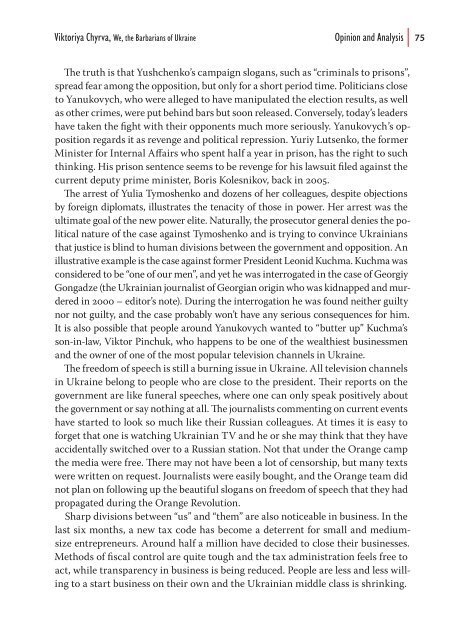Create successful ePaper yourself
Turn your PDF publications into a flip-book with our unique Google optimized e-Paper software.
Viktoriya Chyrva, We, the Barbarians of Ukraine Opinion and Analysis 75<br />
Th e truth is that Yushchenko’s campaign slogans, such as “criminals to prisons”,<br />
spread fear among the opposition, but only for a short period time. Politicians close<br />
to Yanukovych, who were alleged to have manipulated the election results, as well<br />
as other crimes, were put behind bars but soon released. Conversely, today’s leaders<br />
have taken the fi ght with their opponents much more seriously. Yanukovych’s opposition<br />
regards it as revenge and political repression. Yuriy Lutsenko, the former<br />
Minister for Internal Aff airs who spent half a year in prison, has the right to such<br />
thinking. His prison sentence seems to be revenge for his lawsuit fi led against the<br />
current deputy prime minister, Boris Kolesnikov, back in 2005.<br />
Th e arrest of Yulia Tymoshenko and dozens of her colleagues, despite objections<br />
by foreign diplomats, illustrates the tenacity of those in power. Her arrest was the<br />
ultimate goal of the new power elite. Naturally, the prosecutor general denies the political<br />
nature of the case against Tymoshenko and is trying to convince Ukrainians<br />
that justice is blind to human divisions between the government and opposition. An<br />
illustrative example is the case against former President Leonid Kuchma. Kuchma was<br />
considered to be “one of our men”, and yet he was interrogated in the case of Georgiy<br />
Gongadze (the Ukrainian journalist of Georgian origin who was kidnapped and murdered<br />
in 2000 – editor’s note). During the interrogation he was found neither guilty<br />
nor not guilty, and the case probably won’t have any serious consequences for him.<br />
It is also possible that people around Yanukovych wanted to “butter up” Kuchma’s<br />
son-in-law, Viktor Pinchuk, who happens to be one of the wealthiest businessmen<br />
and the owner of one of the most popular television channels in Ukraine.<br />
Th e freedom of speech is still a burning issue in Ukraine. All television channels<br />
in Ukraine belong to people who are close to the president. Th eir reports on the<br />
government are like funeral speeches, where one can only speak positively about<br />
the government or say nothing at all. Th e journalists commenting on current events<br />
have started to look so much like their Russian colleagues. At times it is easy to<br />
forget that one is watching Ukrainian TV and he or she may think that they have<br />
accidentally switched over to a Russian station. Not that under the Orange camp<br />
the media were free. Th ere may not have been a lot of censorship, but many texts<br />
were written on request. Journalists were easily bought, and the Orange team did<br />
not plan on following up the beautiful slogans on freedom of speech that they had<br />
propagated during the Orange Revolution.<br />
Sharp divisions between “us” and “them” are also noticeable in business. In the<br />
last six months, a new tax code has become a deterrent for small and mediumsize<br />
entrepreneurs. Around half a million have decided to close their businesses.<br />
Methods of fi scal control are quite tough and the tax administration feels free to<br />
act, while transparency in business is being reduced. People are less and less willing<br />
to a start business on their own and the Ukrainian middle class is shrinking.



